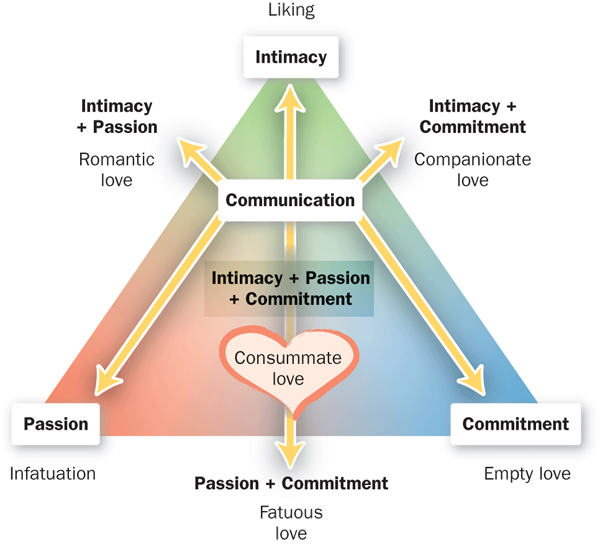Applying the Triangular Theory of Love
Sternberg’s theory can be helpful in relationships in which one or both partners feel dissatisfied or sense that something is missing. Sometimes couples find it difficult to put their finger on exactly what is causing their feelings of discontent or discord with their partner. If they examine their relationship from the perspective of the triangular theory, they may make two important discoveries. First, they may feel encouraged and relieved to find that they are quite strong on one or two of the components. This often helps validate their positive feelings for each other and motivates them to work on other areas in the relationship. Second, they will be able to identify more specifically the aspects of their relationship that may be weak, missing, or in need of work. This, then, will enable them to establish a mutual focus for enhancing and improving the bond between them.
Most people in love relationships tend to feel unhappy at times if any one of the three components—intimacy, passion, or commitment—is weak or missing. You can be in a committed relationship and feel lonely and disconnected if you do not feel that special intimacy with your partner. You can feel angry, frustrated, and betrayed if your relationship lacks commitment. And many couples find themselves dissatisfied and longing for the passion that has faded over time from their relationship, although they continue to experience a strong sense of commitment and intimacy. (This loss of sexual desire is discussed in greater detail in Chapter 7, “Sexual Problems and Solutions.”)
Are you curious about your love triangle? “Self‐Discovery: The Triangle of Your Love” offers you the opportunity to assess where your relationship (current or past) might fall within Sternberg’s theory. Take the scale yourself or with your partner (gently, as a basis for meaningful discussion, not as an argument starter!), or you and your partner might complete the assessment separately and then discuss your results.
One final note about the triangular theory: When college students in my human sexuality classes are asked if they feel Sternberg’s theory had omitted any fundamental components of love relationships, many express that effective communication was at least as important as intimacy, passion, and commitment. Upon further examination and discussion, students conclude that communication was not really a separate component but an inherent part of each of the other three. Without mutually effective communication, they believed that intimacy would never be attained, passion would be less than satisfying, and neither partner would ever be sure of the other’s commitment to the relationship. The students contended, therefore, that communication affects all seven types of love described by Sternberg (and even perhaps non-love). Figure 4.2 shows how they decided to revise Sternberg’s model. The importance and the challenges of effective communication in love relationships will be our next topic of discussion.
Figure 4.2
A Modified Triangular Theory of Love, Incorporating Communication (based on student analysis)

Since You Asked
-
How do you know when things are going wrong or if things are right between you and your partner?
Watch the Video
Relationships and Love